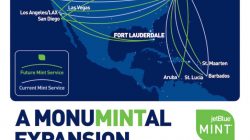I hate being a Debbie Downer. Really I do. I’m typically an optimistic person. A “glass half full” kind of guy. Unless it’s a nice gin and tonic, in which case I’d prefer it to be a “glass completely empty” so I have an excuse to order another one.
But I can’t help being somewhat gloomy today. You’re probably thinking it’s because there was another big devaluation this week. By now everyone knows that United came up with the brilliant idea to move to a revenue-based miles earning system. Their new model is truly innovative and revolutionary and would have been seen as such if only Delta hadn’t stolen it the very next day and traveled back in time to present it as their own last February. Sneaky Delta and their time-traveling tricks. (Wait, I’m pretty sure that’s a movie idea. I can already imagine the trailer: Leonardo DiCaprio and Channing Tatum are an unlikely pair of Delta Red Coats with everything to gain and nothing to lose…)
However, that’s not why I’m gloomy. Yes, another program devalued, but it’s not unexpected. In fact, it was absolutely expected, and unfortunately we can absolutely expect more of these to come. Too many miles floating around chasing too few seats. Something’s gotta give. So I’m practical about this, and as long as a company gives fair notice of a change in their program, I can usually deal with it.
But I’ve noticed a pattern that’s forming every time one of these devaluations gets announced. Basically, the internet gets upset. Very upset. Like “I’m going to make a really clever and really sarcastic meme and put it on my Facebook page and send it to everyone I know” upset.
There’s a lot of gnashing of teeth. Calls to take our business elsewhere. Vows to never fly the offending airline again. And tweeting. Lots and lots of angry tweeting.
“Let them know how you feel!” the Conventional Wisdomers tell us. “Only then will these companies learn to treat their customers better!”
Really? Will these companies stop devaluing their programs if we only let them know how we feel? Will they finally see the error of their ways? Can we bring the airlines/hotels/car rental companies to their knees with our mocking hashtags and angry GIFs?
Or are we all simply tweeting into the abyss?
Conventional Wisdom says there’s power in hashtags.
Granted, when the United devaluation news came down on Tuesday, the reaction was relatively less heated than when American discontinued Explorer Awards in April, or Delta made its second award chart devaluation, or United announced its own award chart increases last November. That’s probably because this devaluation was expected in most quarters in the community. But there were still the usual exhortations to “let United know via letter, call, Twitter and Facebook” how we felt and blog comments insisting that “the FF community should rally and support whole heartedly a few select airlines and programs that are friendly towards us.”
In the past each devaluation has prompted an outpouring of demands by Conventional Wisdomers to make our voices heard. Each time folks have responded in force via social media. If anything, people in the miles and points community are certainly clever. Personally I thought #mAAsacre was quite witty. I have to deduct style points from #UnitedUnfriendly for being a bit unwieldy, but it did have alliteration so extra credit there.
And what did all of this gain us?
Well, of course, Delta undid its decision to move to revenue earning and American put back the Explorer Awards. United even backed off on raising redemption levels for their Star Alliance partners. Frequent flyers were wholly victorious and celebrated into the night by throwing a massive party in several interconnected Hyatt suites acquired via free Diamond Trial upgrades.
No, wait, hold on… I just remembered. None of that happened.
In fact, nothing changed. At all. The airlines like to claim they “listen” to their customers when they make changes to their loyalty programs. But what they actually mean is they listen to their focus groups. When a major decision like a devaluation is made, you better believe a company has done tons of research and tried to find the exact point at which they can get maximum dollars with minimum customer loss. They generally have a pretty good idea of how their clientele will react to the change, and even if the reaction is predicted to be negative, they’ve already decided they’re willing to take the hit, either because they financially have to or simply because they can.
Pew Research found that as of the end of 2013 only 16% of U.S. adults are on Twitter. While their research doesn’t specifically state it, I’m pretty sure they also found it was the loudest 16% of U.S. adults. So companies aren’t going to necessarily take their Twitter feed as a scientific sampling of their customer base.
Voting With Your Wallet
“Nope. You are wrong,” interrupt the Conventional Wisdomers. “We’ve had success getting our message across in the past. What about when Delta tweaked their Same Day Confirmed rule last year? And even American learned their lesson about not giving notice — US Airways just made a minor change to their award chart earlier this week and gave us three months notice. Three months!”
OK, let’s hold off for the moment on concluding that American/US Airways has learned their lesson about giving notice. One minor devaluation with notice does not a turnaround make. But even if they have learned that lesson, it doesn’t change the fact that American did not reverse the elimination of Explorer Awards when there was a huge outcry, or even reopen them for a limited time which would have been fairly easy to do.
And yes, Delta adjusted their Same Day Confirmed rule, but they only barely changed it and it’s hard to argue that it was a result of social media or consumer pressure. Some people even think it was all part of a grand plan by Delta to make huge horrible changes and then give back minor concessions to make it seem like they’re listening to customers. (Wait, I’m pretty sure that’s a movie idea. I can already imagine the trailer: In a world where customers are tricked into liking airlines… Will Smith and Scarlett Johansson have nothing but two “Have One On Us” drink coupons and each other…)
But the more likely scenario is that Delta’s habitual fliers who used the SDC benefit on a regular basis began to move some of their business to other airlines. Delta saw their customers leaving and made a decision to slightly alter course just enough to stem the tide.
Which brings us to the cold hard fact that the only way to change a company’s trajectory on an issue is by no longer patronizing that company. The loss of dollars is the only thing that gets a company’s attention. And by that I mean actually doing it, not just telling an airline that you’re never going to fly with them again. They hear that all the time. They’re used to it. They know almost no one actually follows through.
So take your business elsewhere. Except the problem is where do you take it nowadays?
Fortunately we live in a time where the economy finally seems to be turning around after several long years of being in the dumps. Unfortunately that means we also live in a time where airlines and hotels don’t need as many incentives to fill their seats and rooms. Worse yet, we live in a time when the commercial airline industry has shrunk to just a few major players who control most of the market and don’t have to compete like they used to in order to maintain market share.
So what does one do to register their disapproval? Well, if you really want change, you have to work for it. That means fly Alaska Airlines instead of the majors whenever you can. Get a ticket on JetBlue or Virgin America. Heck, take an Amtrak train instead of the shuttle if you’re traveling in the Northeast Corridor. It might cost more and it may be more inconvenient, but if the miles matter that much to you, make a stand. Just make it more convincing than a snarky tweet.
The Devil’s Advocate says go ahead and tweet your disgust at devaluations, but don’t expect it to alter the march to further devaluations.
Do companies monitor Twitter? Of course. Will they scale back a change if they can do so without significantly affecting their bottom line? Sure, why not. And if a decision is so egregious that customers actually begin leaving, will they begin to look closely at changing that decision? Absolutely.
But once a company makes a devaluation, it’s rare for them to reverse it, and they certainly aren’t going to do so based on perceived public reaction. So if posting a nasty message on their Facebook wall makes you feel better, go for it. But if you want real change, you can only make it happen with your hard earned dollars, and you’ll have to decide if the potential inconvenience or higher price is worth the hassle.
I’m going to end on an upbeat note here. I believe a consolidated airline industry won’t last forever. Nothing attracts new entrants to an industry faster than seeing the current players making big profits. Innovation comes from new entrants and the airline industry is a dearth of innovation right now. At some point someone is going to come along and shake up the entire model, just like Southwest did in the past. When that happens, it’s going to be an exciting time for all of us.
In the meantime, we’re fortunate to have lots of other methods of collecting miles besides flying. We’re in a golden age of credit card bonuses. There’s still plenty of manufactured spend techniques out there. Lots of award charts with sweet spots left to be leveraged. So don’t get too caught up in the social media campaign when you can still be flying through the clouds for free…
Last Week’s Recap – Angled Flat Seats
Thanks a ton to everyone who commented on last week’s post about angled flat seats (see “How I Learned To Stop Worrying And Love Angled Flat Seats“). I was pleasantly surprised at how many people came to the defense of the much maligned angled flat. You guys give me hope! The best comments reminded us what premium airline seats looked (and felt) like 10 or 20 years ago when there was no such thing as “angled flat,” let alone “lie flat.” Let’s just say it wasn’t a pretty picture.
So the next time you find yourself on an angled flat seat, consider yourself fortunate. Just try not to think about the people 10-20 years from now who will mock us for being happy in our quaint business class seats. (Wait, I’m pretty sure that’s a movie idea. I can already imagine the trailer: Robert Downey, Jr. looks aghast as Angelina Jolie breaks the news to him. “You mean they didn’t even have galaxy class seats with gravity-control back in 2014? Ghastly!”)
Devil’s Advocate is a weekly series that deliberately argues a contrarian view on travel and loyalty programs. Sometimes the Devil’s Advocate truly believes in the counterargument. Other times he takes the opposing position just to see if the original argument holds water. But his main objective is to engage in friendly debate with the miles and points community to determine if today’s conventional wisdom is valid. You can suggest future topics by sending an email to dvlsadvcate@gmail.com.




